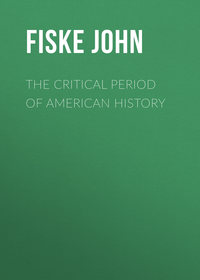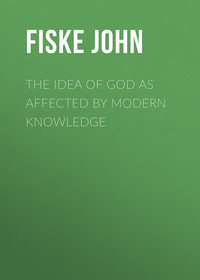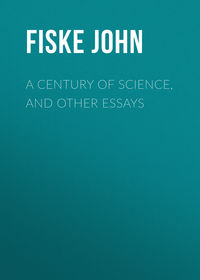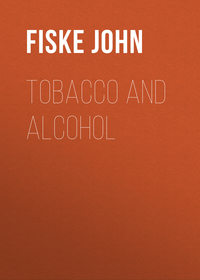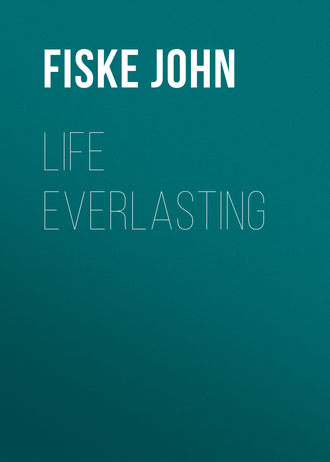 полная версия
полная версияLife Everlasting

John Fiske
Life Everlasting
NOTE
On the evening of December 19, 1900, Mr. Fiske delivered in Sanders Theatre, Cambridge, the address here printed. It was given at the request of Harvard University, in accordance with the terms of the Ingersoll lectureship, but it stood clearly in Mr. Fiske's mind as a continuation, and in a sense the completion, of that series of philosophic studies successively issued under the titles, "The Destiny of Man viewed in the Light of his Origin," "The Idea of God as affected by Modern Knowledge," and "Through Nature to God." Mr. Fiske delayed the publication of "Life Everlasting," and it is possible that he designed amplifying it. Yet, as he stated in his Preface to "The Idea of God," that both that book and "The Destiny of Man" were printed exactly as delivered, "without the addition, or subtraction, or alteration of a single word," so he may have intended to print this study in the same way. At any rate it is now printed exactly as it was delivered, his perfectly clear manuscript being carefully followed.
4 Park Street, Boston
Autumn, 1901
THE INGERSOLL LECTURESHIP
Extract from the will of Miss Caroline Haskell Ingersoll, who died in Keene, County of Cheshire, New Hampshire, Jan. 26, 1893First. In carrying out the wishes of my late beloved father, George Goldthwait Ingersoll, as declared by him in his last will and testament, I give and bequeath to Harvard University in Cambridge, Mass., where my late father was graduated, and which he always held in love and honor, the sum of Five thousand dollars ($5,000) as a fund for the establishment of a Lectureship on a plan somewhat similar to that of the Dudleian lecture, that is – one lecture to be delivered each year, on any convenient day between the last day of May and the first day of December, on this subject, "the Immortality of Man," said lecture not to form a part of the usual college course, nor to be delivered by any Professor or Tutor as part of his usual routine of instruction, though any such Professor or Tutor may be appointed to such service. The choice of said lecturer is not to be limited to any one religious denomination, nor to any one profession, but may be that of either clergyman or layman, the appointment to take place at least six months before the delivery of said lecture. The above sum to be safely invested and three fourths of the annual interest thereof to be paid to the lecturer for his services and the remaining fourth to be expended in the publishment and gratuitous distribution of the lecture, a copy of which is always to be furnished by the lecturer for such purpose. The same lecture to be named and known as "the Ingersoll lecture on the Immortality of Man."
LIFE EVERLASTING
Few incidents in ancient history are more tragic than the death of Pompey. The spectacle of the mighty warrior who had conquered the Orient and contended with Cæsar for the mastery of the world, a defeated and despairing fugitive, treacherously murdered and lying unburied on the Egyptian strand, was one that drew tears from Cæsar himself and from many another. Yet among the poets of the sixteenth century Renaissance there was one who took a different view of the matter. In an epigram of incomparable beauty Francesco Molsa exclaims: —
Dux, Pharea quamvis jaceas inhumatus arena,Non ideo fati est sævior ira tui:Indignum fuerat tellus tibi victa sepulcrum;Non decuit cœlo, te, nisi, Magne, tegi!It is almost impossible to preserve in a translation the peculiar charm of these lines, but a friend of mine in one of the pleasant student days of forty years ago produced this happy and fitting paraphrase: —
We grieve not, Pompey, that to theeNo earthly tomb was given;All lands subdued, nought else was freeTo shelter thee but Heaven!Here the art of the poet lies in the boldness with which he seizes upon one of the most subtle and startling effects of contrast. In the very circumstance which to the ancient mind was the acme of humiliation and horror his genius discerns the occasion for most exalted panegyric, the bitterness of death is lost in the abounding triumph of the soul enlarged and set free, the attributes of woe are transformed into crowning glories.
It is just in this spirit of the Modenese poet that mankind has sought to take away from death its sting, from the grave its victory. That solemn moment in which, for those who have gone before and for us who are to follow, the eye of sense beholds naught save the ending of the world, the entrance upon a black and silent eternity, the eye of faith declares to be the supreme moment of a new birth for the disenthralled soul, the introduction to a new era of life compared with which the present one is not worthy of the name. Τίς δ’ οἶδέν, exclaims Euripides,
Τίς δ’ οἶδέν εἰ τὸ ζῇν μέν ἐστι κατθανεῖν,Τὸ κατθανεῖν δὲ ζῇν;Who can tell but that this which we call life is really death, from which what we call death is an awakening? From this vantage ground of thought the human soul comes to look without dread upon the termination of this terrestrial existence. The failure of the bodily powers, the stoppage of the fluttering pulse, the cold stillness upon the features so lately wreathed in smiles of merriment, the corruption of the tomb, the breaking of the ties of love, the loss of all that has given value to existence, the dull blankness of irremediable sorrow, the knell of everlasting farewells, – all this is seized upon by the sovereign imagination of man and transformed into a scene of transcending glory, such as in all the vast career of the universe is reserved for humanity alone. In the highest of creatures the Divine immanence has acquired sufficient concentration and steadiness to survive the dissolution of the flesh and assert an individuality untrammelled by the limitations which in the present life everywhere persistently surround it. Upon this view death is not a calamity but a boon, not a punishment inflicted upon Man, but the supreme manifestation of his exceptional prerogative as chief among God's creatures. Thus the faith in immortal life is the great poetic achievement of the human mind, it is all-pervasive, it is concerned with every moment and every aspect of our existence as moral individuals, and it is the one thing that makes this world inhabitable for beings constructed like ourselves. The destruction of this sublime poetic conception would be like depriving a planet of its atmosphere; it would leave nothing but a moral desert as cold and dead as the savage surface of the moon.
We have now to consider this supreme poetic achievement of man – his belief in his own Immortality – in the light of our modern studies of evolution; we must notice some distinctions between its earlier and later stages, and briefly examine some of the objections which have been alleged in the name of science against the validity of the belief.
Here, as in all departments of the efflorescence of the human mind, the beginnings were lowly, and necessarily so. Nothing very lofty or far-reaching could be expected from the kind of brain that was encased in the Neanderthal skull. Among existing savages there are tribes concerning which travellers have doubted whether they possess ideas that can properly be called religious. But wherever untutored humanity exists we find the conception of a world of ghosts more or less distinctly elaborated; the thronging simulacra of departed tribesmen linger near their accustomed haunts, keenly sensitive to favour or neglect, and quick to punish all infractions of the rules which the stern exigencies of life in the wilderness have prescribed for the conduct of the tribe. This crude primeval ghost-world is thus already closely associated with the ethical side of life, and out of this association have grown some of the most colossal governing agencies by which the development of human society has been influenced. It is therefore not without reason that modern students of anthropology devote so much time to animism and fetishism and other crude workings of that savage intelligence of which the primeval ghost-world is a product.
It is not at all unlikely that the savage's notion of ghosts may have originated chiefly in his experience of dreams, and this is the explanation at present most in favour. The sleeping warrior ranges far and wide over the country, while he chases the buffalo and joins in the medicine dance with comrades known to have died yet now as active and as voluble as himself, but suddenly the scene changes and he is back in his familiar hut surrounded by his people who can testify that he has not for a moment left them. It is not unlikely, I say, that the notion of one's conscious self as something which can quit the material body and return to it may have started in such often-repeated humble experiences. It can hardly be doubted, however, that this savage conception of the detachable conscious self is simply the primitive phase of the Christian conception of the conscious soul which dwells within the perishable body and quits it at death. Through many stages of elaboration and refinement the sequence between the two conceptions is unmistakable.
At this point the materialist interposes with an argument which he regards as crushing. He reminds us that if we would estimate the value of an idea, as of a race-horse or a mastiff, it is well to take a look at its pedigree. What, then, is to be said – he scornfully asks – of a doctrine of personal immortality which when reduced to its lowest terms is seen to have started in a savage's misinterpretation of his dreams? What more is needed to prove it unworthy of the serious attention of a scientific student of nature? On the other hand, the student whose mood is truly scientific will feel that one of mankind's cardinal beliefs must not be dismissed too lightly because of the crudeness and error in that primitive stratum of human thought in which it first took root. In his perceptions within certain limits the savage is eminently keen and accurate, but when it comes to intellectual judgments that go at all below the surface of things his mind is a mere farrago of grotesque fancies, wherein, nevertheless, some kernels of truth are here and there embedded. It is a long way from the dragon swallowing the sun to the interposition of the moon's dark body between us and that luminary. The dragon was a figment of fancy, but the eclipse was none the less a fact.
Now if we may take an illustration from the workings of an infant's mind, it is pretty clearly made out that as baby sits propped among his pillows and turns his eyes hither and thither in following his mother's movements to and fro in the room, she seems in coming toward him to enlarge and in going away to diminish in size, like Alice in Wonderland. It is only with the education of the eye and the small muscles which adjust it that the larger area subtended on the retina instantly means comparative nearness and the smaller area comparative remoteness. At first the sensations are interpreted directly, and the impression upon baby's nascent intelligence is a gross error. The mother is not waxing great and small by turns, but only approaching and receding. If, however, we consider that in baby's mind the enlarged retinal spot means more and the diminished spot less of the pleasurable feelings excited by a familiar and gracious presence, the approach of which is greeted with smiles and out-stretched arms, while its departure is bemoaned with cries and tears, we see that as to the essentials of the situation the dawning intelligence is entirely right, although its specific interpretation is quite wrong. Mamma has not really dwindled and vanished like the penny in a conjurer's palm, but has only flitted from the field of vision.
To come back now to our primeval savage, when he sees in a dream his deceased comrade and mistakes the vision for a reality, his error is not concerned with the most fundamental part of the matter. The all-important fact is that this dreaming savage has somehow acquired a mental attitude toward death which is totally different from that of all other animals, and is therefore peculiarly human. Throughout the half-dozen invertebrate branches or sub-kingdoms, where intelligence is manifested only in its lower forms of reflex action and instinct, we find no evidence that any creature has come to know of death. There is a sense, no doubt, in which we may say that the love of life is universal. As a rule, all animals shun danger, and natural selection maintains this rule by the pitiless slaughter of all delinquents, of all in whom the needful inherited tendencies are too weak. But in the lower animal grades and in the vegetal world the courting of life and the shrinking from death go on without conscious intelligence, as the blades of grass in a meadow or the clustering leaves upon a tree compete with one another for the maximum of exposure to sunshine until perhaps stout boughs and stems are warped or twisted in the struggle. Among invertebrates, even when we get so high as lobsters and cuttlefish, the consciousness attendant upon the seizing of prey and the escape from enemies probably does not extend beyond the facts within the immediate sphere of vision. Even among those ants that have marshalled hosts and grand tactics there is doubtless no such thing as meditation of death. Passing to the vertebrates, it is not until we reach the warm-blooded birds and mammals that we find what we are seeking. Among sundry birds and mammals we see indications of a dawning recognition of the presence of death. An early manifestation is the sense of bereavement when the maternal instinct is rudely disturbed, as in the cow mourning for her calf. This feeling goes a little way, but not a great way, beyond the sense of physical discomfort, and is soon relieved by milking. Much more intense and abiding is the feeling of bereavement among birds that mate for life, and among the higher apes, and it reaches its culmination in the dog whose intelligence and affections have been so profoundly modified through his immensely long comradeship with man. Nowhere in literature do we strike upon a deeper note of pathos than in Scott's immortal lines on the dog who starved while watching his young master's lifeless body, alone upon a Highland moor: —
"How long didst thou think that his silence was slumber?When the wind stirred his garment, how oft didst thou start!"Yet even this devoted creature could have carried his thoughts but little way toward the point reached by our dreaming savage with his incipient ghost-world. More power of abstraction and generalization was needed. While the sight of the killing of a fellow-creature may arouse violent terror in the higher mammals below man, there is nothing to indicate that the sight of the dead body awakens in the dumb spectator any general conceptions in which his own ultimate doom is included. The only feeling aroused seems to vary between utter indifference and faint curiosity. Professor Shaler makes a statement of cardinal importance in this connection when he says: "If we should seek some one mark which, in the intellectual advance from the brutes to man, might denote the passage to the human side, we might well find it in the moment when it dawned on the nascent man that death was a mystery which he had in his turn to meet."1
It is therefore interesting to note that the first approaches, albeit remote ones, toward a realizing sense of death occur among those animals in which the beginnings of family life have been made, and the habitual exercise of altruistic emotions helps to widen the intelligence and facilitate the appropriation to one's self of the experiences of one's comrades and mates. Such is the case with permanently mated birds and with the higher apes, while the case of the dog, exceptional as it is through his acquired dependence upon man, has similar implications. Now I have elsewhere proved and repeatedly illustrated that the leading peculiarity which distinguished man's apelike progenitors from all other creatures was the progressive increase in the duration of infancy, which was a direct consequence of expanding intelligence, and was moreover the immediate cause of the genesis of the human family and of human society. It appears now that the realizing sense of death, such as we find it in untutored men of primitive habits of thought, has originated in the selfsame circumstances which have wrought the mighty change from gregariousness to sociality, from the general level of mammalian existence to the unique level of humanity. I have elsewhere called attention to the profoundly interesting fact that the notion of an Unseen World beyond that in which we lead our daily lives is coeval with the earliest beginnings of Humanity upon our planet. We may now observe that it adds greatly to the interest and to the significance of this fact, when we find that the very circumstances which tended to single out our progenitors, and raise them from the average mammalian level into Manhood, tended also to make them realize the problem of death and meet it with a solution. The grouping of facts now begins to make it appear that this primeval solution was but the natural outcome of the whole cosmic process that had gone before; that when nascent Humanity first eluded the burden of the problem by rising above it, this was but part and parcel of the unprecedented cosmic operation through which man's Humanity was developed and declared. The long and cumulative play of cause and effect which wrought the lengthening of the period of helpless babyhood and the correlative maternal care, and which thus differentiated the non-human horde of primates into a group of human clans, was attended by a strong development of the sympathetic feelings as it vastly increased the mutual dependence among individuals. During the same period the gradual acquirement of articulate speech was accompanied by a great increase in the powers of abstraction and generalization. These new capacities were applied to the interpretation of death, just as they were applied to all other things; and thus, in the very process of becoming human, our progenitors arose to the consciousness of death as something with which humanity has always and everywhere to reckon. From the earliest and most rudimentary stages of the process, however, the conception of death was not of an event which puts an end to human individuality, but of an event which human individuality survives. If we look at the circumstances of the genesis of mankind purely from the naturalist's point of view, it cannot fail to be highly significant that the mental attitude toward death should from the first have assumed this form, that the human soul should from the start have felt itself encompassed not only by the endless multitude of visible and tangible and audible things, but also by an Unseen World. In view of this striking fact it is of small moment that the earliest generalizations which in course of time developed into a world of ghosts and demons were grotesquely erroneous. Primitive theorizing is sure to be faulty and in the light of later knowledge comes to seem absurd and bizarre. Such has been in modern days the fate of the savage's ghost-world, along with the Ptolemaic astronomy, the doctrine of signatures, and many another sample of the "wisdom of the ancients." But the fact that primitive man mis-stated his relation to the Unseen World in no wise militates against the truth of his assumption that such a world exists for us.
To this question as to the truth of the assumption I shall return in the sequel. We have very briefly sketched the manner of its origination, and here we may leave this part of our subject with the remark that the belief in a future life, in a world unseen to mortal eyes, is not only coeval with the beginnings of the human race but is also coextensive with it in all its subsequent stages of development. It is in short one of the differential attributes of humanity. Man is not only the primate who possesses articulate speech and the power of abstract reasoning, who is characterized by a long period of plastic infancy and a corresponding capacity for progress, who is grouped in societies of which the primordial units were clans; he is not only all this, but he is the creature who expects to survive the event of physical death. This expectation was one of his acquisitions gained while attaining to the human plane of existence, and the interesting question in the natural history of man is whether it is to be regarded as a permanent acquisition, or is rather analogous to the organ that subserves, perhaps through long ages, an important but temporary purpose, after the fulfilment of which it dwindles into a rudiment neglected and forgotten.
I do not overlook the existence of divers theological systems in which the attitude toward a future life is very different from that with which our Christian education has made us familiar. We sometimes hear such systems cited as exceptions to the alleged universality of the human belief in immortality. The Buddhist looks forward through myriads of successive sentient existences to a culminating state of Nirwana, which if not actual extinction is at least complete quiescence, the absolute zero of being. It hardly needs saying, however, that Buddhistic theology, though it may have arrived at such a zero through long flights of metaphysical reasoning, is nevertheless based in all its foundations upon the primitive belief in man's survival of death. Sometimes it is said that the Jews of the Old Testament times had no proper conception of immortality. It can hardly be maintained, however, that such stories as that of the conversation at Endor between the living Saul and the dead Samuel could emanate from a people destitute of belief in a life after death. In point of fact ancient Jewish thought abounds in traces of the primitive ghost-world. It is only by contrast with the glorious and inspiring Christian development of the belief in immortality that the earlier dispensation seems so jejune and meagre in its faith. There was little to arouse religious emotion in the dismal world of flitting shadows, the Sheol or Hades from which the Greek hero would so gladly have escaped, even to take the most menial position in all the sunlit world. Greek and Hebrew thought, in what we call the classic ages, stood alike in need of religious revival. The mythic lore of the Greek mind had flowered luxuriantly in æsthetic fancies, while the spiritual life of Judaism languished amid strict obedience to forms and precepts. The far-reaching thoughts of Greek philosophers and the lofty ethics of Hebrew preachers were divorced from the primitive ghost-world, even as the mental processes of the modern scholar are separated by a great gulf from those of the woman who comes to scrub the floor. The advent of Christianity fused together the various elements. The doctrine of a future life was endowed with all the moral significance that Jewish thought could give to it, and with all the mystic glory that Hellenic speculation could contribute, so that the effect upon men was that of a fresh revelation of life and immortality through the gospel. Grotesque and hideous features also were brought in from the ghost-worlds of the classic ages, as well as from that of the Teutonic barbarians, and the result is seen in mediæval Christianity. At no other time, perhaps, has the Unseen World played such a leading part in men's minds as in the twelfth and thirteenth centuries of our Christian era, in the age that witnessed the culmination of sublimity in church architecture, in the society whose thought found comprehensive expression in the "Summa" of St. Thomas, as the thought of our times is expressed in Spencer's "First Principles," in an intellectual atmosphere, which just as it was about passing away was depicted for all coming time in the poem of Dante. It was a time of spiritual awakening such as mankind had never before witnessed, but it was also an age of new problems, an age wherein the seeds of revolt were thickly germinating. The nature and constitution of the Unseen World had been too rashly and too elaborately set forth in theorems born of the slender knowledge of primitive times, and the growing tendency to interrogate Nature soon led to conclusions which broke down the old edifice of thought. In the sixteenth century came Copernicus and administered such a shock to the mind as even Luther's defiance of the papacy scarcely equalled. In recent days, when Bishop Wilberforce reckoned without his host in trying to twit Huxley with his monkey ancestry, our minds were getting inured to all sorts of audacious innovations, so that they did not greatly disturb us. For its unsettling effects upon time-honoured beliefs and mental habits the Darwinian theory is no more to be compared to the Copernican than the invention of the steamboat is to be compared to the voyages of Columbus. We are in no danger of overrating the bewilderment that was wrought by the discovery that our earth is not the physical centre of things, and that the sun apparently does not exist for the sole purpose of giving light and warmth to man's terrestrial habitat. We need not wonder that in conservative Spain scarcely a century ago the University of Salamanca prohibited the teaching of the Newtonian astronomy. We need not wonder that Galileo should have been commanded to hold his tongue on a topic that seemed to cast discredit upon the whole theology that assumes man to be the central object of the Divine care.




